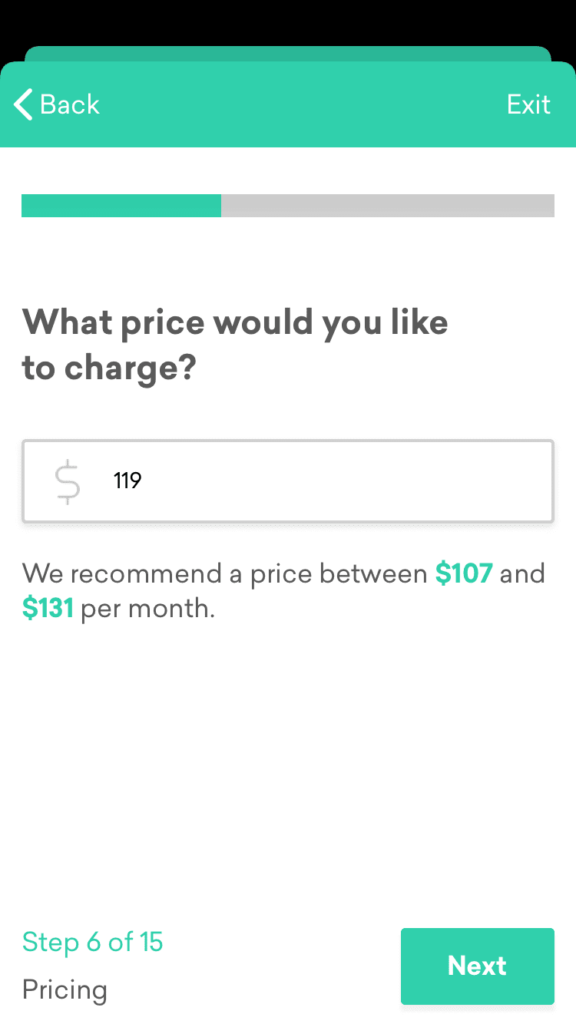Neighbor storage has a simple premise: it wants to be the Airbnb of the storage industry. Yes, it’s true – you can make money renting out parts of your home for people’s stuff! RSG contributor Chonce Maddox-Rhea shares this Neighbor storage review, including how Neighbor storage works, what you can earn, and how to get started.
Have you ever considered renting out your space for extra cash? It turns out, there’s a huge market for that!
Neighbor is a flexible storage marketplace that helps make this possible.
Recently, Harry interviewed Neighbor founder and CEO, Joseph Woodbury. He said the average host can make around $2,000 a year, but power hosts (people who rent out multiple spaces or have bigger storage spaces) can make up to $20,000 a year.
In fact, you can view the whole interview with Neighbor founder and CEO Joseph Woodbury here: How Much Can You Make Using Neighbor Storage To Rent A Space?
Can’t host your space but want an affordable rental? You’re in luck too! Managing Editor Melissa currently pays $70 a month for a traditional storage space (5×5).
On Neighbor? $26 a month for a 5×5 – and that’s not including the 50% first month discount! That’s more than 50% off traditional storage!
It’s a great option to rent out space you’re not using whether it’s your garage, backyard shed, or guest room. In this Neighbor storage review, I’ll go over how it works, what you can expect to earn, along with some key pros and cons.
Quick links:
- Get started with Neighbor
- Additional ideas on how to make money
What is Neighbor Storage?
Neighbor is a marketplace for people who are looking for a place to store their belongings nearby. If you’re looking to become a host, you can use Neighbor to list your storage space for free.
People can use your garage to store anything from their car or boxes. Just like the name suggests, a neighbor comes to your space and uses it to store something for a set period of time. The best part is that you can get paid a monthly fee to offer up your space for storage.
There is great earning potential in the storage industry, with the average monthly storage unit across the nation costing around $88 per month.
Here’s a quick explanation from Neighbor on how Neighbor works:
Why is Neighbor Storage Better Than A Storage Unit?
Neighbor storage is an affordable self storage option for people who need a place to keep belongings. From a renter’s perspective, Neighbor provides a cheap self-storage alternative to other more costly local storage options. It’s also likely that you may find an affordable self-storage option near your own home.
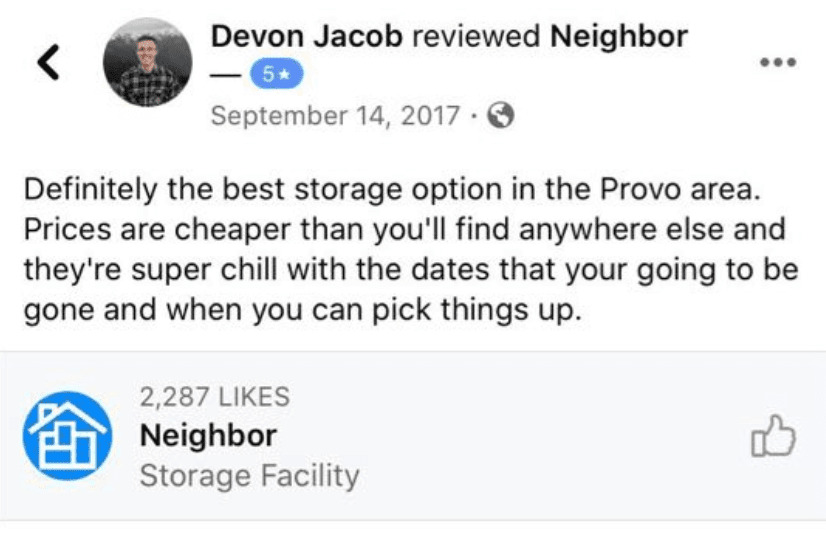
In addition, Neighbor storage is generally in residential areas – not industrial areas that are more prone to break ins because there is less activity and traffic at night. Finally, if you are moving or need to quickly access your stuff as a renter, chances are Neighbor storage will be closer to where you live vs. an industrial park.
From a host’s perspective, it’s a great way to earn some extra passive income without actually hosting people. If you have extra storage space in your house, consider cashing it in by listing it on Neighbor.
You won’t have to worry about hospitality or cleaning up after others, so it’s a lot less work than using a platform like Airbnb.
Plus, even if you don’t have a lot of space you can still make money. For example, we don’t have a basement, but we do have a garage and a shed where we can store things on Neighbor.
Neighbor Storage Features
You aren’t charged for listing your space on Neighbor. You’ll connect your bank account because Neighbor storage does charge a 4.9% processing fee + $0.30 since you’ll receive payments through the platform (via direct deposit).
The fee goes towards helping run Neighbors automated billing direct deposit to hosts and also the $1M host guarantee. This is a form of liability protection for hosts each time a renter uses your listing.
There is no minimum or maximum timeframe that renters can request to use Neighbor.
Neighbor storage automatically charges renters and takes that issue of worrying about collecting payment off the table.
The renter will pay Neighbor at the beginning of the month, and the money will be transferred to your account at the end of the month. Your payments will never be prorated.
Even if a renter takes their belongings out before the end of a given month you will still receive the full payment. You’ll always know what you’re going to make by month.
Neighbor storage makes the communication between renters and hosts easy with the messaging feature right through the app. This is where hosts can get to know renters and even set up a meeting in person.
Hosts will also have access to nationwide customer service, the opportunity to screen potential renters, and the ability to require a photo ID from renters.
Take a look at the video below from Investing Made Simple about what Neighbor looks like from the host’s side:
Neighbor Storage Pros and Cons: For Hosts
Interested in getting started and signing up with Neighbor storage? Take a look at this list of pros and cons.
Pros
- Make money from your unused space, including a closet, basement, garage, or empty shed
- Listing on Neighbor storage is completely free
- You have control over what goes in your space – you can decline any reservations or requests
- Earn hundreds or thousands of dollars a year, depending on the size of what you’re renting out (basement, garage, closet, etc.)
- You determine how much access to give to renters – 24/7, only upon request, etc.
- Neighbor provides insurance for items and general liability insurance, too
Cons
- Demand (and earnings) depends on where you live – cities will have more demand and higher earnings for hosts
- There is a service fee for hosts – this fee is for connecting renters to hosts
- This part of your home will be unusable to you, since the renter’s stuff will be there
Neighbor Storage Protection for Hosts and Renters
- Make money from your unused space, including a closet, basement, garage, or empty shed
- Listing on Neighbor storage is completely free
- You have control over what goes in your space – you can decline any reservations or requests
- Earn hundreds or thousands of dollars a year, depending on the size of what you’re renting out (basement, garage, closet, etc.)
- You determine how much access to give to renters – 24/7, only upon request, etc.
- Neighbor provides insurance for items and general liability insurance, too
Cons
- Demand (and earnings) depends on where you live – cities will have more demand and higher earnings for hosts
- There is a service fee for hosts – this fee is for connecting renters to hosts
- This part of your home will be unusable to you, since the renter’s stuff will be there
Neighbor Storage Protection for Hosts and Renters
Storage protection should be a concern for both the host and renter. There’s nothing wrong with that and it’s completely normal.
Luckily, Neighbor has protections in place for both parties. As mentioned, hosts have the $1M host guarantee there if they need it. There are a few things protected and not protected with this guarantee.
Protected
- Personal liability claims from Neighbor renters or their authorized parties (has to be related to a storage reservation)
- Every Neighbor host in the U.S.
Not Protected
- Insurance deductibles
- Property damage
- Any claim that does not follow Neighbors resolution process
Renters have the $25,000 renter guarantee. This protects all their belongings up to $25,000. All items must be disclosed before beginning the reservation, especially any item over $1,000. Vehicles have to be properly registered and insured.
What Can You Rent Out On Neighbor?
The great thing about Neighbor storage is you can make money from renting out a garage or various different types of spaces for storage. There is actually a wide variety of things you can rent out on the platform including:
- Extra land
- Boating dock
- Barn
- RV Pad
- Basement
- Bedroom
- Storage facility
- Lot
- Warehouse
- Shed
- Pantry
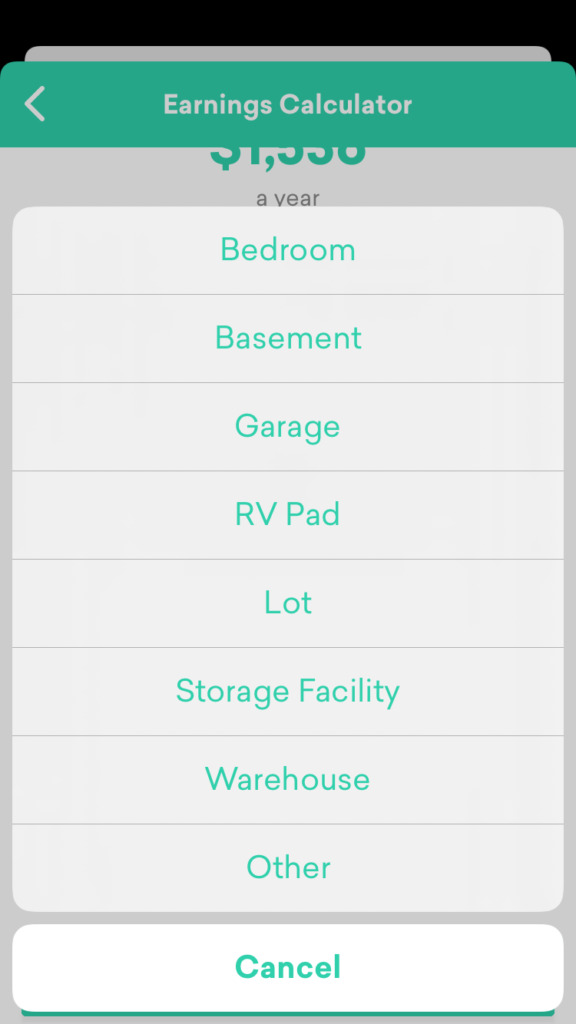
Additionally, Woodbury offered the following tips for Neighbor storage hosts to earn more:
- The top hosts on Neighbor have 4 or more professional pictures of their space – Neighbor will send a professional photographer to your home, too – make sure to request it!
- Some of the items stored are high dollar, so people want to know their items are safe and secure. Clear photos and even a safety system will go a long way to justifying a higher price on the host side
- Responsive hosts make more – people appreciate being able to quickly communicate with hosts
Neighbor Offers a Cheaper Alternative for Renters
Storage units can get expensive. Sure, they give you a month free in some places, but outside of that the price can add up in a hurry. Neighbor is an alternative to those expensive prices.
In addition, Neighbor encourages new hosts to give a 50% discount on the first month of storage, which makes storage even more affordable for renters.
As a comparison, when Melissa and her family moved states, they needed to put some of their stuff in a storage facility while they house hunted. Currently, Melissa is paying $70 a month for a 5×5 self-storage rental about 20 minutes away from where she lives.
On Neighbor, she found a 5×5 for $26 a month. That doesn’t include the 50% off first month discount (bringing it to $17.74 for the first month – Neighbor charges a service fee for renters). While this rental is a total of 30 minutes away from where she lives, it’s an over 50% savings per month. Worth it!
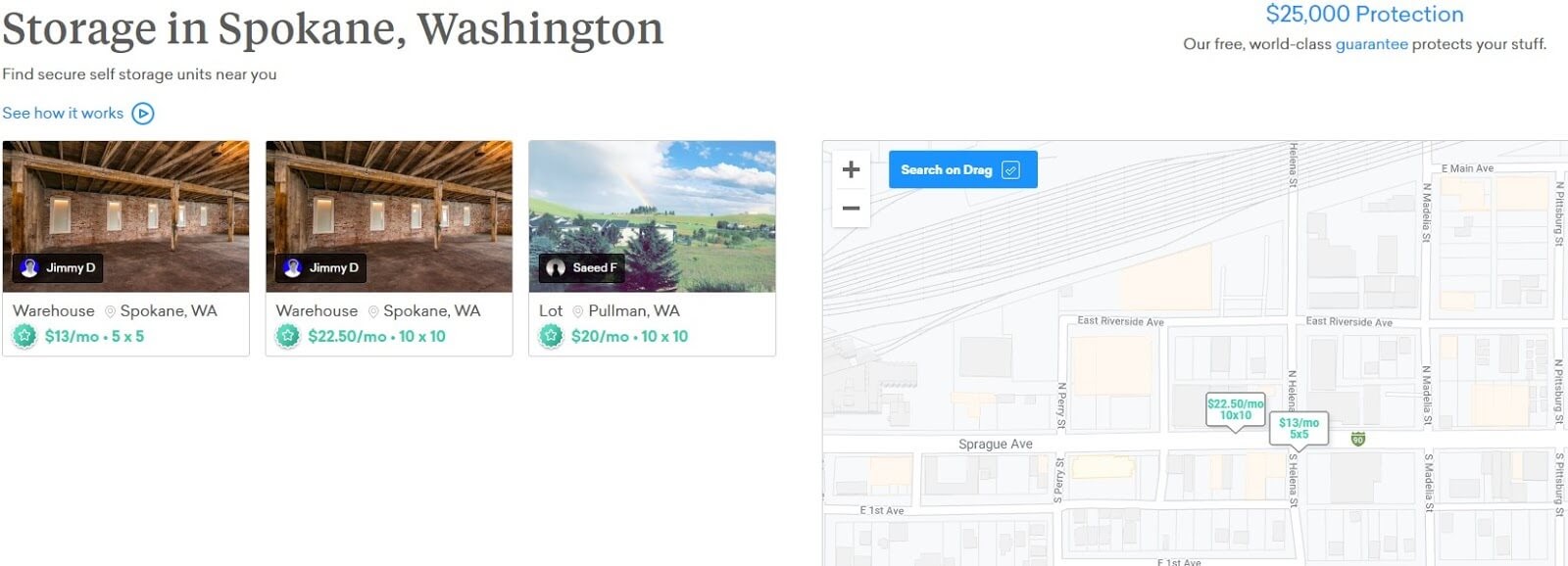
Live in a bigger city? Your options as a renter are even more plentiful – and cheaper! Check out what options a city like Phoenix has – including a bedroom storage option!
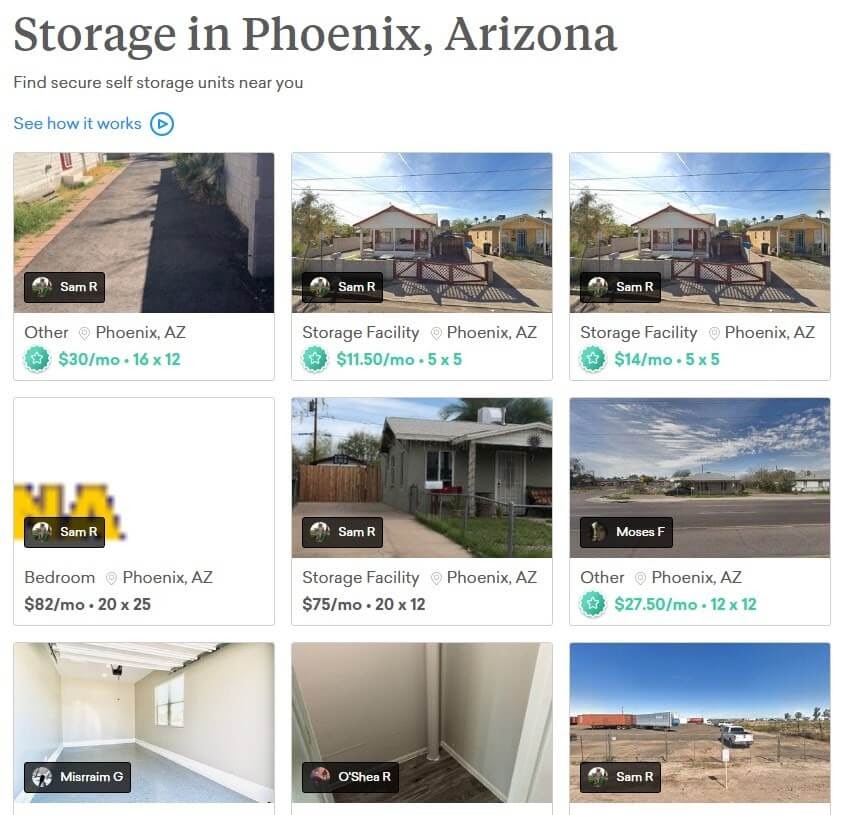
As a renter, Neighbor makes it easy to see what storage options, like this bedroom example below, are available from hosts:
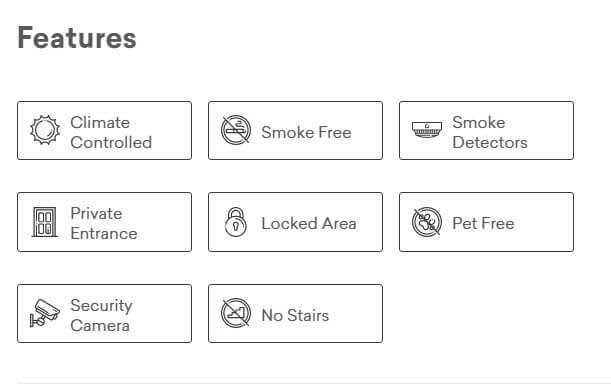
Neighbor Will Continue to Grow
Neighbor storage first launched in 2017 with nearly $2.5 million in seed funding. According to Inside Self Storage, Neighbor started 2020 off with a $10 million Series A funding led by Silicon Valley venture-capital firm.
The company plans to use this to strengthen its presence in core markets like Los Angeles and Salt Lake City while also furthering expansion to other areas across the U.S.
Want to learn more about Neighbor, including its growth trajectory and trends in the self-storage industry? Check out Harry’s interview with CEO Joseph Woodbury here.
FAQs about Neighbor Self Storage
How do you make money as a Neighbor storage host?
Become a host by listing your space as an available storage rental. Renters will pay you monthly to store their stuff. As a host, you are in charge of setting the price for your storage space.
Neighbor storage does recommend price ranges, but you make the final decision. Neighbor even lets you offer a 50% discount on the first month’s payment to help get renters interested.

What are hosts liable for?
Neighbor has a Renter Guarantee that guarantees their items up to $25,000. As long as hosts aren’t the reason behind damage to a renter’s possession then they are not liable.
What if your storage space is damaged by a renter?
Neighbor storage has a guarantee in place to protect your property in this event. As a host, you also have the right to choose who you rent your space out to and everyone who uses the platform must go through a verification process.
How does Neighbor help hosts find renters?
The app allows hosts to see renters nearby. Before approving a reservation, you can read each renter’s profile, see what they want to store, and learn more about their specific needs.
Can you choose which requests or reservations to approve?
Yes you have 48 hours to approve or deny a request.
Do you need to pay Neighbor to rent out your storage space?
Not to list your space, but once you book a reservation you’ll be charged 4.9% of the gross reservation +$0.30.
How does Neighbor make money from this?
Neighbor earns money from charging renters a service fee and also collects from hosts.
How much should hosts charge for their storage space?
You will get recommendations from Neighbor storage, but you can list the space at whatever price you would like. They do want lists to be 50% cheaper than traditional storage units. To have the best chance to have your space rented out, use prices already listed on Neighbor as a guide.

CEO and Neighbor Founder Joseph Woodbury shared some additional tips for host success, too:
- Most profitable rentals have at least 4 photos or more on the site
- Some of the items stored are high-dollar items, and people want to know they are safe and secure
- Responsiveness plays a big part as well – ability to answer people’s questions in a timely manner
How do hosts get paid?
Renters pay Neighbor at the start of each month and hosts will receive that money toward the end of the month.
Can renters live in the host’s storage space?
No, renters aren’t allowed to live in storage spaces.
Final Words
Neighbor storage is a refreshing platform to see as it’s a decent affordable self storage alternative. Plus, it’s an easy way to make money with space that you may not be using.
You may not make tons of money on Neighbor, but it is still a solid option for diversifying your income without doing much work. Overall, Neighbor seems to be living up to its reputation as the ‘Airbnb of storage’.
Would you consider using Neighbor, either as a host or a renter?
